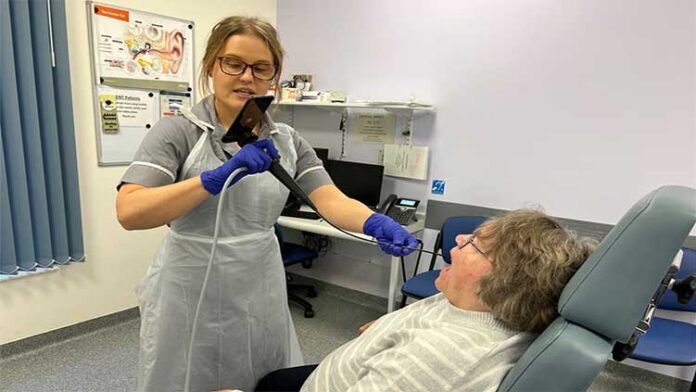A groundbreaking medical technology trial is currently being conducted by the NHS, aimed at enhancing the early detection of throat cancer through the use of smartphones. With an alarming rise in patient referrals leading to extensive waiting lists, this initiative promises to significantly improve the efficiency of cancer screening processes.
Currently, patients who are anxious about possible throat cancer often face long wait times—sometimes extending to several weeks—before receiving the all-clear. The introduction of a novel camera device that can be attached to an iPhone is set to change this. This device captures high-quality images instantly, enabling specialists to examine potential signs of cancer and provide results within hours rather than weeks.
Janet Hennessy, a 76-year-old participant from Bradeley in Stoke-on-Trent, shared her positive experience with the trial. “Procedures like this normally took up to three weeks. I think the app is absolutely brilliant,” she expressed, reflecting the sentiments of many who have waited anxiously for diagnosis and treatment.
Dr. Cally Palmer, the NHS national cancer director, emphasized the critical importance of early cancer detection. She noted that quick results can lead to timely treatment, improving the chances of survival for patients. “For those needing tests to investigate suspected cancer, it can be an extremely worrying time. Being able to rule out the disease sooner can make a huge difference for people and their families,” Dr. Palmer stated, highlighting the emotional toll that uncertainty can impose on patients and their loved ones.
Ajith George, a consultant head and neck surgeon at University Hospitals North Midlands NHS Trust, praised the new device for its potential to revolutionize the cancer referral system. He remarked that it represents a “radical change” necessary for addressing the increasing demand on NHS services. “Streamlining services helps keep the focus on those unfortunate patients who get a cancer diagnosis,” Mr. George noted, pointing out the challenges that healthcare providers face in maintaining effective care under pressure.
The NHS is currently navigating significant challenges, particularly in cancer treatment schedules. Recent projections from Cancer Research UK indicate that by 2029, over 300,000 patients may experience delays in receiving necessary care. This underscores the urgency of implementing innovative solutions like the smartphone attachment for cancer screening.
Typically, patients suspected of having throat cancer undergo an endoscopy—a procedure that involves using a long, thin tube equipped with a camera, inserted through the mouth or nose to examine the throat and surrounding areas. The new endoscope-i adapter, compatible with iPhones, features a 32mm lens and a dedicated app that enables nurses to capture images and securely share them with specialists via cloud technology. This could potentially streamline the diagnostic process and enhance accessibility for patients.
The device, developed by medical technology firm Endoscope-i Ltd, is currently being tested in the West Midlands, and there are hopes that it could eventually be integrated into various healthcare settings. This would allow patients to receive testing closer to home, minimizing the need for hospital visits.
Since the COVID-19 pandemic, there has been a notable surge in the number of patients being urgently referred for cancer testing, despite no corresponding rise in actual cancer diagnoses. Statistics reveal that only about 5 percent of approximately 250,000 urgent referrals for suspected head and neck cancer result in a cancer diagnosis. This disparity highlights the importance of improving diagnostic capabilities to ensure that resources are efficiently utilized.
As the trial progresses, there is optimism surrounding the potential of this innovative approach to significantly enhance the diagnostic landscape for throat cancer and potentially other medical conditions. With technology continuing to advance at a rapid pace, the integration of smartphone capabilities in medical diagnostics could usher in a new era of patient care, where timely and accurate diagnosis becomes the norm rather than the exception.
By leveraging everyday technology, healthcare providers can improve patient experiences and outcomes, making healthcare more responsive to the needs of the public. The impact of this initiative could resonate far beyond the trial phase, leading to lasting changes in how medical diagnoses are conducted, ultimately aiming to save lives and alleviate the burden on healthcare systems.


